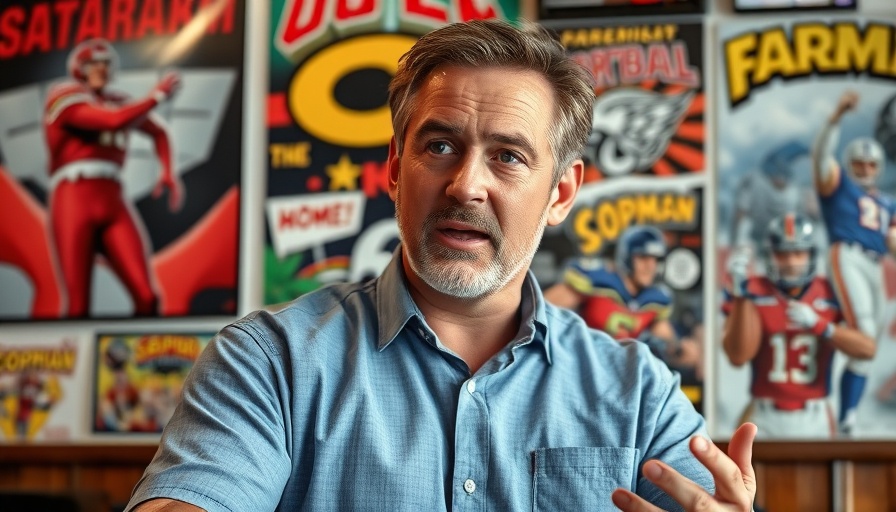
Revisiting the Debate: Faith vs. Atheism in Today's Society
In our modern world, discussions about belief systems often lead us to confront challenging questions about existence, morality, and the nature of reality. The recent video titled “Why I am an Atheist” Response contributes significantly to this discourse, as it showcases a thought-provoking analysis of belief and skepticism. The speaker articulates a position that separates atheism from common misconceptions, emphasizing that not every non-believer is motivated by a desire to reject moral accountability or due to past grievances.
The video ‘Why I am an Atheist Response’ brings forth important discussions on faith and belief, prompting us to delve deeper into these themes.
The crux of the argument presented is centered on the idea that both believers and non-believers seek explanations for the universe that resonate with reason and understanding. This frames a deeper dialogue—not one of collision, but of seeking common ground. The speaker's assertion that they would rather embrace an incomplete worldview that offers compelling explanations rather than a more defined belief system that falls short could resonate with many. For those questioning their faith or trying to comprehend opposing viewpoints, this conversation is essential.
Why Does This Matter in Our Faith Journeys?
Understanding these discussions is crucial for believers strengthening their faith. Many individuals grapple with doubts, and the existence of differing ideologies can instill both confusion and curiosity. It is vital for those within faith communities to engage with such complexities to foster a more profound understanding of their beliefs. The inquiry of whether a complete belief system, like Christianity, truly addresses the deep questions about our origin and moral bearings is integral.
This line of questioning helps fortify belief systems when they are examined in the light of philosophical engagements. Recognizing, as the speaker notes, that many of the profound questions—like the fine-tuning of the universe, the parameters of morality, and our understanding of consciousness—point toward a rationale for belief in a deity, can bolster one's faith. However, it challenges believers to articulate their perspectives beyond personal experience, grounding them in rational ways that resonate with an increasingly skeptical audience.
Science and Belief: Is There Room for Both?
One of the compelling arguments made by the speaker is that while science and atheism do not account for everything, they do provide valuable insights into our existence. The pursuit of understanding through scientific means does not diminish the search for moral or existential truths; instead, it can complement the pursuit of faith. Many church leaders advocate for an integrated approach to learning that connects science with theological teachings, inviting curiosity rather than fear of conflicting narratives. The foundational belief that God created an orderly universe aligns seamlessly with the scientific quest to unravel its mysteries. This perspective encourages youth and college students to explore the intersection of their faith with academic inquiries.
The Rationality of Belief: Math, Order, and Existence
Moreover, the speaker raises important questions regarding the orderliness of the universe and our capacity to understand it through mathematics. When contemplating why the world follows rational laws and why our minds can grasp complex formulas, one might find intuitive answers in divine engagement. This idea can be particularly gratifying for parents and educators wishing to impart a holistic worldview to the younger generation. By encouraging discussions that weave together faith, logic, and science, we can help foster in our children a sense of wonder and curiosity about God's creation.
Navigating Belief and Doubt Within Our Communities
As we continue to explore these themes, it’s essential to engage with diverse perspectives and arguments respectfully. The video emphasizes that not all atheists come from a place of rebellion against God; rather, some may genuinely seek answers that align with observable reality. This recognition can help cultivate an atmosphere in church communities where open dialogues flourish. Skeptics and seekers can be invited to express their doubts without fear of condemnation, thus paving the way for thoughtful corrective conversations that inspire growth for all.
Conclusion: Embrace the Conversation
In conclusion, engaging with the discussions surrounding belief and atheism enriches our understanding of both. The insights brought forth in the video “Why I am an Atheist” Response guide us through pivotal questions worth addressing. By fostering an environment where inquiries are welcomed and explored, believers and skeptics alike can navigate their paths toward a more profound understanding of existence. In doing so, we strengthen our convictions while allowing for genuine exploration in faith.
Consider initiating meaningful conversations in your community today, exploring the ideas presented in this video to deepen your understanding and that of those around you. Remember, it’s in the shared discourse that we often find the threads of commonality that unite us.
 Add Row
Add Row  Add
Add 








Write A Comment